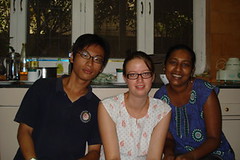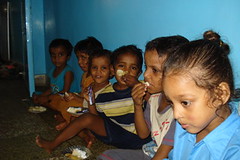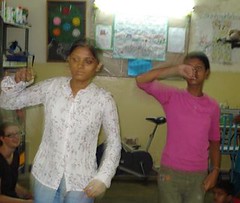by Anuradha Bakshi | Aug 24, 2007 | women centre
Welcome to the why women centre!
Though the why women centre was born out of necessity it truly came alive last night when Firdaush our energetic volunteer from Paris decided to spend a night with the girls. It was a fun filled night but one where plans were made, dreams redefined and, beleive it or not, serious work initiated.
Bags and jewellery was designed keeping in mind parisian taste, creche activities planned, time tables set, but what was most important was that the spirit of the centre was defined: one of trust and understanding, laughter and gaiety and motivation and determination.
These women have come a long way and made a jouney many would have given up half way. The beat all odds and overcame many obstacles with no bitterness or anger. Somehow during that night the past was buried and healed once in for all and only tomorrow mattered. A morrow where they would reinvent themselves and prove to the often unforgiving world outside that nothing is impossible as long as someone is wiling to give one a second chance.
We invite to a sneak view of that incredible night

by Anuradha Bakshi | Aug 23, 2007 | sealing, two indias

Champa may soon lose her home, one she has lived in since she was a very tiny girl. Champa lives at the ill famed transit camp with her mother who works in homes as a maid.
For the past few days Champa has not been able to comprehend why her mom has not gone to work. She normally leaves at 6 am, even locking Champa out. Champa cannot comprehend why everyone is shouting and cluttering the street. All this is disturbing and unsettling.
What Champa is witnessing from the confines of her simple mind is actually a plight that is befalling many residents in India’s capital city. The transit camp, as its name implies, is land that was given to slum dwellers two decades ago, when they were moved out of an upmarket location. At that time one wonders whether anyone understood what transit meant, or whether the authorities gave them a specified time frame. Over the years this camp turned into a vibrant and crowded colony, with multi floored structures where rooms were given out on rent. Greed and false promises of regularisation made by local politicians looking for votes lent a sense of false permanence and some original allottees even sold out their plots.
For the past year or so this long forgotten colony once at the edge of the city, came back into the limelight as authorities rediscovered the meaning of transit. Since many an attempt to seal or raise it have been made, each met with the understandable anger of the residents aptly supported by some local politico or the other resulting in the usual drama of protests and arrests.
But this time for reasons yet unknown it seems that this colony will be destroyed and thousands of men,women and children will yet again be rendered homeless notwithstanding their ration card or voter’s ID that proudly displays a transit camp address. This time it seems that the game is over and no amount of palm greasing or political support will help.
The transit camp issue brings to light one of the worst ailment that plague our social fabric. Whereas we all know that the rule of law must prevail, laws are never respected at the initial moment but allowed to be circumvented endlessly till all avenues are explored regardless of the human factor but propelled by the greed of one and all. As a society we have to be made to understand that laws need to be respected from the time they are promulgated.
Champa’s case is poignant. If her home is relocated she loses not only her home, but also the safety and protection of pwhy where she spends the only happy moments of a very sad life.

by Anuradha Bakshi | Aug 21, 2007 | Uncategorized

One of the biggest asset of pwhy has been its band of volunteers. They have come from every corner of the planet and each one has left his or her mark. This summer we were truly spoilt as we had not one, not two but three superb volunteers: Lucy, Xiong and Firdaush.
At first we were a little worried about how we would manage three volunteers in our tiny project but our concerns were soon allayed as these three young people just adopted us and found their place in a jiffy. It was as if they had always been part of pwhy.
Lucy a young student from Cambridge spent her mornings with our special kids and her afternoons in the newly opened Sanjay colony centre; Xiong from Singapore taught the secondary kids in the morning and then spent his afternoons at our Govindpuri centre and Firdaush brought high levels of energy to our creche and prep kids and some order to our Okhla centre.
What was truly amazing is how these young people adapted to the difficult environment they found themselves in: electricity cuts that made the heat unbearable, the filth of the slum lanes, the sometimes too spicy lunch, the often incomprehensible Hinglish. Nothing could deter their enthusiasm and drive. The seriousness and application with which they approached each task was laudable and praiseworthy.
They came from different worlds and yet seemed so comfortable in ours. Each one brought to pwhy something special, something that will stay forever in intangible and yet precious ways.

by Anuradha Bakshi | Aug 20, 2007 | Uncategorized

The recent spat between a young athlete’s coach and his mother has led to a child’s future being held to ransom. It is true that in Budhia’s case a solution will be found as he he is a media celebrity but the whole issue opens up a disturbing debate.
In an answer to a recent mail a friend wrote: The thought scares me that by providing support, we may also be creating a social monster which gets used to being fed. He was referring to my concern about the future of the children that transit project why or as a mater of fact the future of all children who acquire a mediocre education as that is what the present system has on offer. In its mission statement the lead India campaign states: our municipal schools are not equipped to impart even basic education but stops short of suggesting an alternative.
Seven years ago, when pwhy began, one lived under the illusion that education would open new avenues for children and hence give them a better future. Today if one were to be honest, experience has proved that it is not quite so. No matter how brilliant a slum kid is, he will never the the 90+% required to go to a good college, nor will he acquire the confidence, communication skills and the oomph required in today’s working world. His marks may help him break some barriers but what about those who just scrape through.
The social monster referred to above is just that child, the one who holds a degree or certificate in hand and thus as arrogated itself the right to dream big. The question one is compelled to ask one’s self is whether it is right to impart such education and feel satisfied? Is not one morally bound to think ahead and look for viable options?
The education for all campaign seems to have gone awry. There are schools without children, children with years of schooling and no knowledge. Budgets allocations increase each year but the situation on the ground worsens. Much needs to be done. Imparting a useless education is worse than no education at all.
Maybe there is a monster lurking, one that needs to be slain not fed

by Anuradha Bakshi | Aug 16, 2007 | two indias
 R and S are hearing impaired. R is 19 and S 14. They are both students of our special section and are real live wires. In the last years they have learnt many things from tailoring to cooking, from paper craft to weaving. R is a talented artist and S can cut and stitch a mean suit. They have evolved their won ways of communicating and have opinions on every and any thing. And yes they can even dance to the latest Bollywood number not missing a beat. R has finished training as a beautician and has a part time job at the local beauty parlour. S will also get the same training soon and join the ranks of the gainfully employed. Both are happy young girls who have taken life’s challenges in their stride.
R and S are hearing impaired. R is 19 and S 14. They are both students of our special section and are real live wires. In the last years they have learnt many things from tailoring to cooking, from paper craft to weaving. R is a talented artist and S can cut and stitch a mean suit. They have evolved their won ways of communicating and have opinions on every and any thing. And yes they can even dance to the latest Bollywood number not missing a beat. R has finished training as a beautician and has a part time job at the local beauty parlour. S will also get the same training soon and join the ranks of the gainfully employed. Both are happy young girls who have taken life’s challenges in their stride.
They both belong to poor families. S’s father is a small time tailor and R’s father keeps poor health and thus does not work much. Like for all girls in India, their parents hope to get them married one day.
A few months ago some visitors from Europe came to pwhy and were touched by these tow vibrant young ladies. They wanted to know whether there was any way in which their hearing could be restored. We had of course explored all ways when they first came to us and had been told that only a cochlear implant could help the, the boggling 1 million rupees that such an implant cost put an end to our efforts.
Last week I got a mail saying that there could be a possibility of sponsoring the implants and seeking added information. True cochlear implants are done In India at the cost of 6 to 9 hundred thousand rupees. there is an added cost of 100 000 Rs for the operation and one has speech therapy for at least two years, regular implant programming and life long annual follow ups. The operation is daunting for any one and more so for simple families who barely survive let alone live. The likelihood of these two young ladies being married in another city or village is real and that would put an end to follow ups and complex programming. The implant could become an impediment rather than an asset.
As we sat with the teachers and special educators wondering what to do, we realised that both R and S were comfortable in their silent world. They had evolved their own ways of dealing with life’s realities. They somehow were far more independent than many other young girls their age who hear but have not been educated. They have various skills and hence many avenues are open to them. A complex surgery may turn out to be a hindrance and destabilise them completely. The whopping amount spent would ultimately bring more trouble than joy.
At times like these, the existence of two Indias becomes painfully real and puts us in a disturbing dilemma. To heart or not to hear, that is the question.




